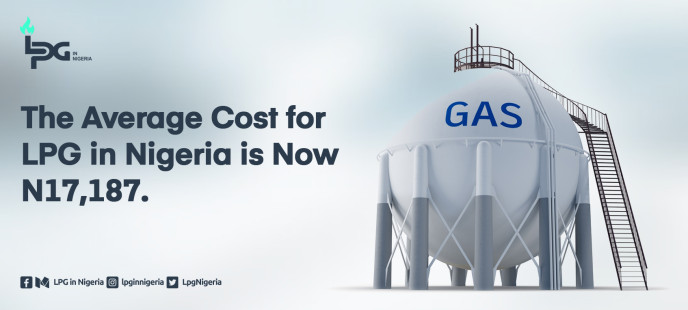- 5323
- 0
Sharing Ideas and Updates on LPG in Nigeria and related information to enable effective collaboration within the LPG Value Chain
The Average Cost For LPG In Nigeria Is Now 17,187 Naira

The cost of Liquefied Petroleum Gas (LPG) in Nigeria varies significantly across different regions, reflecting the challenges and dynamics of transportation, distribution, and market demand. Based on current data, the average price of a 12.5 kg cylinder of LPG in Nigeria is 17,187.50 Naira, though prices fluctuate widely depending on the location.
Prices Across Different States and Cities in Nigeria
We were able to get 22 responses across all of our social media pages (Facebook, X and WhatsApp). These prices are recorded below:
Ogbia LGA, Bayelsa State: 1,400 Naira per kg, totaling 17,500 Naira for 12.5 kg.
Owode Iyewa, Ogun State: 1,350 Naira per kg, totaling 16,875 Naira for 12.5 kg.
Edo (Supplier): 1,250 Naira per kg, totaling 15,625 Naira for 12.5 kg.
Edo (Retail): 1,400 Naira per kg, totaling 17,500 Naira for 12.5 kg.
Ibeju Lekki: 1,400 Naira per kg, totaling 17,500 Naira for 12.5 kg.
Warri: 1,400 Naira per kg, totaling 17,500 Naira for 12.5 kg.
Ijede, Ikorodu: 1,400 Naira per kg, totaling 17,500 Naira for 12.5 kg.
Ketu, Lagos: 1,400 Naira per kg, totaling 17,500 Naira for 12.5 kg.
Ibadan: 1,200 Naira per kg, totaling 15,000 Naira for 12.5 kg.
Lagos Mainland: 1,300 Naira per kg, totaling 16,250 Naira for 12.5 kg.
FCT: 1,400 Naira per kg, totaling 17,500 Naira for 12.5 kg.
Kaduna: 1,300 Naira per kg, totaling 16,250 Naira for 12.5 kg.
Jos: 1,450 Naira per kg, totaling 18,125 Naira for 12.5 kg.
Owerri: 1,250 Naira per kg, totaling 15,625 Naira for 12.5 kg.
Nassarawa: 1,400 Naira per kg, totaling 17,500 Naira for 12.5 kg.
Port Harcourt: 1,500 Naira per kg, totaling 18,750 Naira for 12.5 kg.
Rivers: 1,500 Naira per kg, totaling 18,750 Naira for 12.5 kg.
Kogi: 1,350 Naira per kg, totaling 16,875 Naira for 12.5 kg.
Abia: 1,400 Naira per kg, totaling 17,500 Naira for 12.5 kg.
Anambra: 1,400 Naira per kg, totaling 17,500 Naira for 12.5 kg.
Kebbi: 1,300 Naira per kg, totaling 16,250 Naira for 12.5 kg.
Adamawa: 1,500 Naira per kg, totaling 18,750 Naira for 12.5 kg.
Regional Variations in LPG Prices
In areas like Ibadan and Owerri, the price per kilogram is as low as 1,200 Naira and 1,250 Naira, respectively, leading to a 12.5 kg cylinder cost of 15,000 Naira and 15,625 Naira. These lower prices may be attributed to proximity to distribution centers and a lower cost of transportation.
In contrast, regions like Port Harcourt, Rivers, and Adamawa report prices of 1,500 Naira per kilogram, amounting to a 12.5 kg cylinder price of 18,750 Naira. These higher costs may stem from increased transportation expenses, local demand pressures, or infrastructural limitations impacting the efficiency of gas distribution.
Factors Influencing LPG Prices
Transportation Costs: The logistics of transporting LPG from refineries or importation points to various parts of the country significantly affect prices. For example, locations farther from major distribution hubs, such as Adamawa, face higher transportation costs, reflected in their retail prices.
Supply Chain Inefficiencies: Some regions benefit from the presence of local suppliers, like Edo, where supplier prices are 1,250 Naira per kilogram. Such competitive pricing keeps costs lower compared to areas reliant on external supply chains.
Demand Variability: Urban centers like Lagos Mainland and FCT maintain moderate prices at 1,300-1,400 Naira per kilogram, likely due to the balance of steady demand and efficient supply chain operations.
Market Accessibility: Rural or less accessible areas often see higher prices due to the compounded costs of distribution and limited competition among suppliers.
Managing LPG Costs
To mitigate these price disparities, stakeholders can focus on the following:
Improving Infrastructure: Enhancing storage and distribution networks could reduce the overall cost of transportation and ensure steady supply to underserved areas.
Encouraging Local Production: Boosting domestic LPG production and reducing reliance on imports can stabilize prices and minimize the impact of global market fluctuations.
Consumer Awareness: Educating consumers on proper cylinder maintenance and efficient usage can help them optimize their gas consumption and reduce expenses.
The LPG market in Nigeria reflects the complex interplay of economic, logistical, and infrastructural factors. While the average price offers a benchmark, regional disparities highlight the need for targeted interventions to ensure affordability and accessibility for all Nigerians. As the nation continues to expand its gas infrastructure and prioritize energy transition, addressing these price gaps will be crucial to fostering equitable energy access.
















0 Comment.